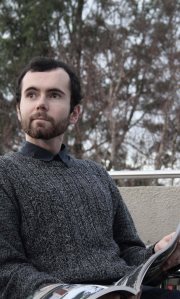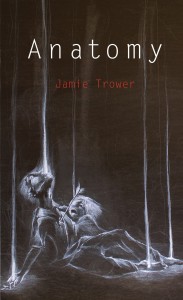

Mary McCallum of Mākaro Press interviews debut poet Jamie Trower about his collection Anatomy, which they published under their Submarine imprint in 2015.
(for my review of the book see here)
Mary McCallum: As a new poetry publisher we get a lot of emails from people wanting to submit their collections of poetry. Some of those emails are like explosive devices — as soon as you open them you know you’re in danger. All the tiny words on the screen shimmer with the excitement of being written by someone for whom words are not simply tools or exciting ways to evoke the world of experience or imagination, but tiny rockets that have changed or saved a life.
This was the case when I opened an email from Aucklander Jamie Trower – a young man in his early twenties who had only just discovered poetry, but who had nonetheless crafted a whole collection that he wanted me to read. A collection of poems that charted his recovery from a terrible childhood brain injury that could have killed him.
What a ride. It felt to me reading Anatomy for the first time – and I continue to feel this – that Jamie had given himself permission to write how he wanted to write, and discover what he wanted to discover using words in a way that he’d never thought possible. With obvious delight he raged on the page, and laughed at and interrogated it. Words came and he connected them and lit the fuse. Which is not to say Jamie wasn’t open to editing. He was. He loved the whole process … more of a chance to play with words, more connections to fire. We published it, dear reader, and this week I talked to Jamie about the book so close to his heart – how he wrote it and why, and where to now.
M: What made you start to write poetry?
J: In the months of rehab after I sustained a severe brain injury as a nine-year-old, I learned to use a typewriter. I wrote sporadic, jumbled notes of how I was feeling and the changes I noticed in my wheelchair-bound body. I really started writing poetry after taking a creative writing course at the University of Auckland two years ago. It was then that I went back to the notes that I wrote in rehab and found myself expanding and stretching the words into poetry.
M: What do you like about it?
J: The beauty and ease of poetry. How a single moment can be expanded on, heightened, strengthened, transformed, stretched, redefined and moulded in a couple of lines. How a writer can adapt a thought, a feeling or an event so easily through compressed, rhythmic language.
M: Who are your poetry heroes? Are there any poets you try and emulate?
J: I am in awe of Sam Hunt, Paul Muldoon, Ben Okri – the list goes on! I think their writings are compelling and eloquently formed. I draw on their poetry quite a bit – how they use simple thoughts and words to create a big impact.
M: Your poetry collection feels like one long narrative poem about what you went through when you had a brain injury as a child – rather than lots of separate poems – do you see it that way?
J: Anatomy is definitely narrative in its structure: a start, middle and end. I tried to separate the poetic canvas by titling the poems – making it feel like more of a collection rather than a narrative – and pairing it with a traditional form of storytelling. I decided in the editing process to parallel poetry with prose to guide the reader, and to allow the emotion I felt to show through more.
M: In Anatomy you indicate the typewriter was an important tool in your rehab – is poetry also important as a form of therapy in getting over what happened to you?
J: Poetry will always be my rehab, my therapy, my hospital, my home. This use of self-expression and self-examination helped me (and still does) realise that I needed to take control of my own body, my own disability. I hope to continue to use the lessons that poetry has taught me for many years to come.
M: What are you writing now?
J: I’m writing my next poetry collection, and I’m brainstorming a novel on the side. I’m excited to see what comes of it!
M: Who are you reading?
J: Right now I’m reading Michele Leggott’s Heartland (for the tenth time, it feels). She very kindly came to the launch of Anatomy, which was very, very cool.
Mākaro Press page
